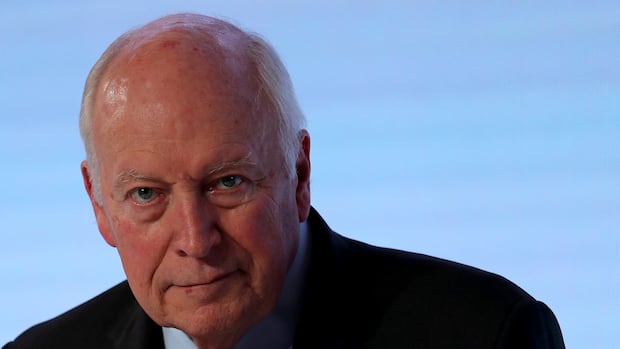Dick Cheney, the hard-charging conservative who became one of the most powerful and polarizing vice-presidents in U.S. history and a leading advocate for the 2003 invasion of Iraq, has died at age 84.
Cheney died Monday night due to complications of pneumonia and cardiac and vascular disease, according to a statement from his family.
“Dick Cheney was a great and good man who taught his children and grandchildren to love our country, and to live lives of courage, honour, love, kindness, and fly fishing,” the statement said. “We are grateful beyond measure for all Dick Cheney did for our country. And we are blessed beyond measure to have loved and been loved by this noble giant of a man.”
The neoconservative’s influence spanned nearly a half-century in Washington politics. After serving in various positions in Richard Nixon’s administration, he eventually became chief of staff for Nixon’s successor, Gerald Ford.
George W. Bush chose Cheney as his running mate in 2000, ahead of his two-term presidency. Bush expressed his condolences to Cheney’s family on Tuesday, calling his death a “loss to the nation and a sorrow to his friends.”
“Dick was a calm and steady presence in the White House amid great national challenges,” Bush said. “I counted on him for his honest, forthright counsel, and he never failed to give his best. He held to his convictions and prioritized the freedom and security of the American people.”
White House to Congress and back
Cheney wasn’t out of politics for long after Ford was defeated in the 1976 election, running for Congress out of Wyoming and serving in the U.S. House of Representatives for a decade, a period of time that overlapped with Republican Ronald Reagan’s two terms as president.
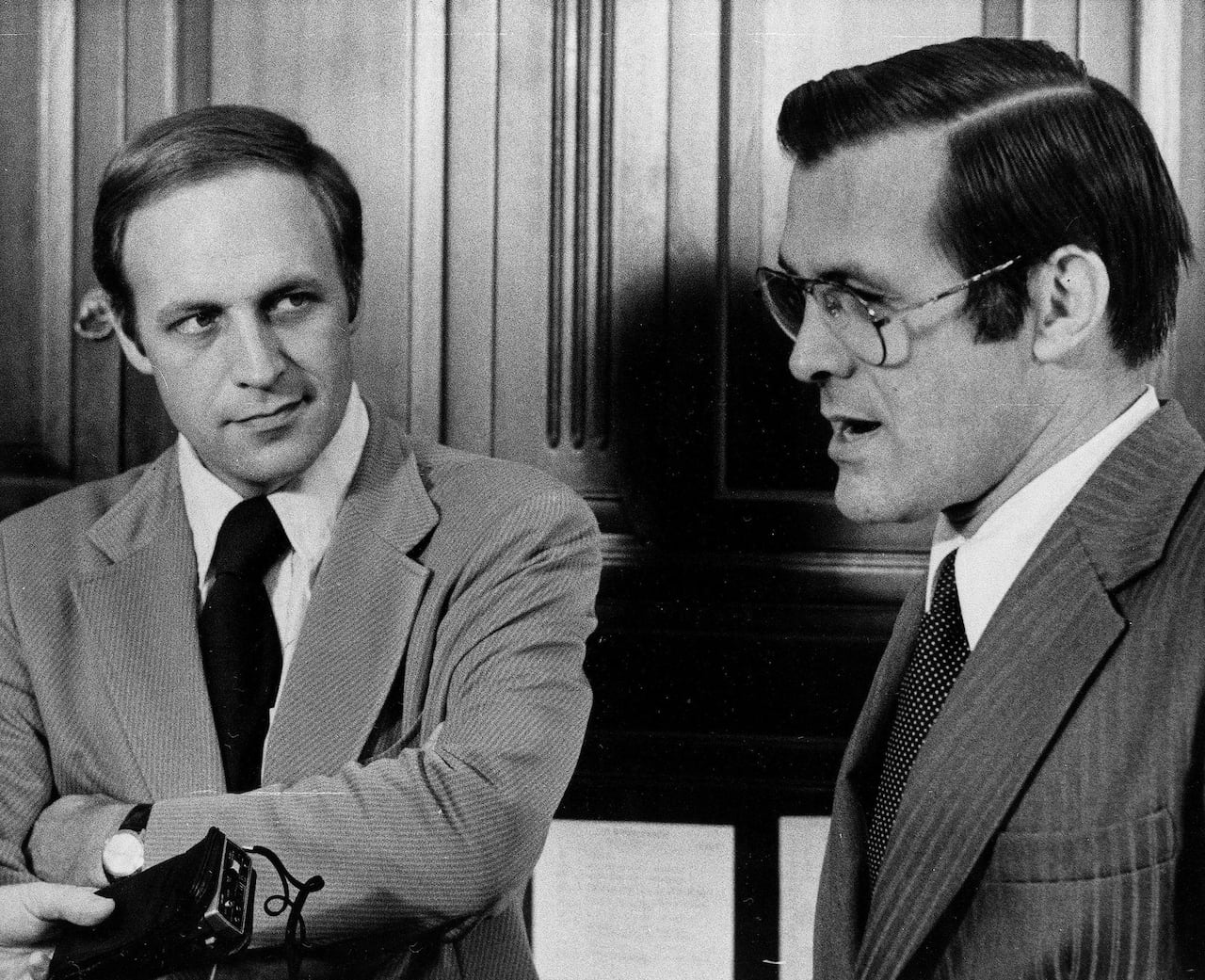 Dick Cheney is shown with Donald Rumsfeld on Nov. 7, 1975, when both served in Gerald Ford’s administration. Cheney and Rumsfeld were later key figures in the U.S.’s invasion in Iraq in 2003 during George W. Bush’s administration. (The Associated Press)
Dick Cheney is shown with Donald Rumsfeld on Nov. 7, 1975, when both served in Gerald Ford’s administration. Cheney and Rumsfeld were later key figures in the U.S.’s invasion in Iraq in 2003 during George W. Bush’s administration. (The Associated Press)
Cheney was nominated to serve as defence secretary by Republican president George H.W. Bush in 1989. Cheney led the armed forces in a military operation in Panama that saw dictator Manuel Noreiga removed from office to face criminal charges in the U.S., as well as the Persian Gulf War of 1990-1991, in which Iraqi troops were driven from Kuwait.
After spending much of the 1990s in the private sector, including as chief executive officer for multinational oil company Halliburton, Cheney was brought on as a presidential campaign adviser for Bush’s son George W.
The younger Bush tasked him in April 2000 with overseeing his vice-presidential nominee selection team.
“Fortunately, there are many good candidates to chose from in our party,” Cheney said at the time. “We will look at them all.”
Cheney would ultimately recommend himself for the role, and Bush agreed, calling him a “man of great integrity and judgment and experience” who was “capable of being president.” Bush brushed aside concerns about his 59-year-old running mate’s history at the time of three heart attacks and a 1988 quadruple bypass operation.
Not a ceremonial VP
Former vice-president John Nance Garner was attributed with demeaning the role as not worth a bucket, or pitcher — depending on the retelling — of warm spit.
In Cheney’s time in office, the vice-presidency was no longer merely a ceremonial afterthought. Cheney made it a network of back channels from which to influence policy on Iraq, terrorism, presidential powers, energy and other cornerstones of a conservative agenda.
“I made the decision when I signed on with the president that the only agenda I would have would be his agenda, that I was not going to be like most vice-presidents — and that was angling, trying to figure out how I was going to be elected president when his term was over with,” Cheney once said.
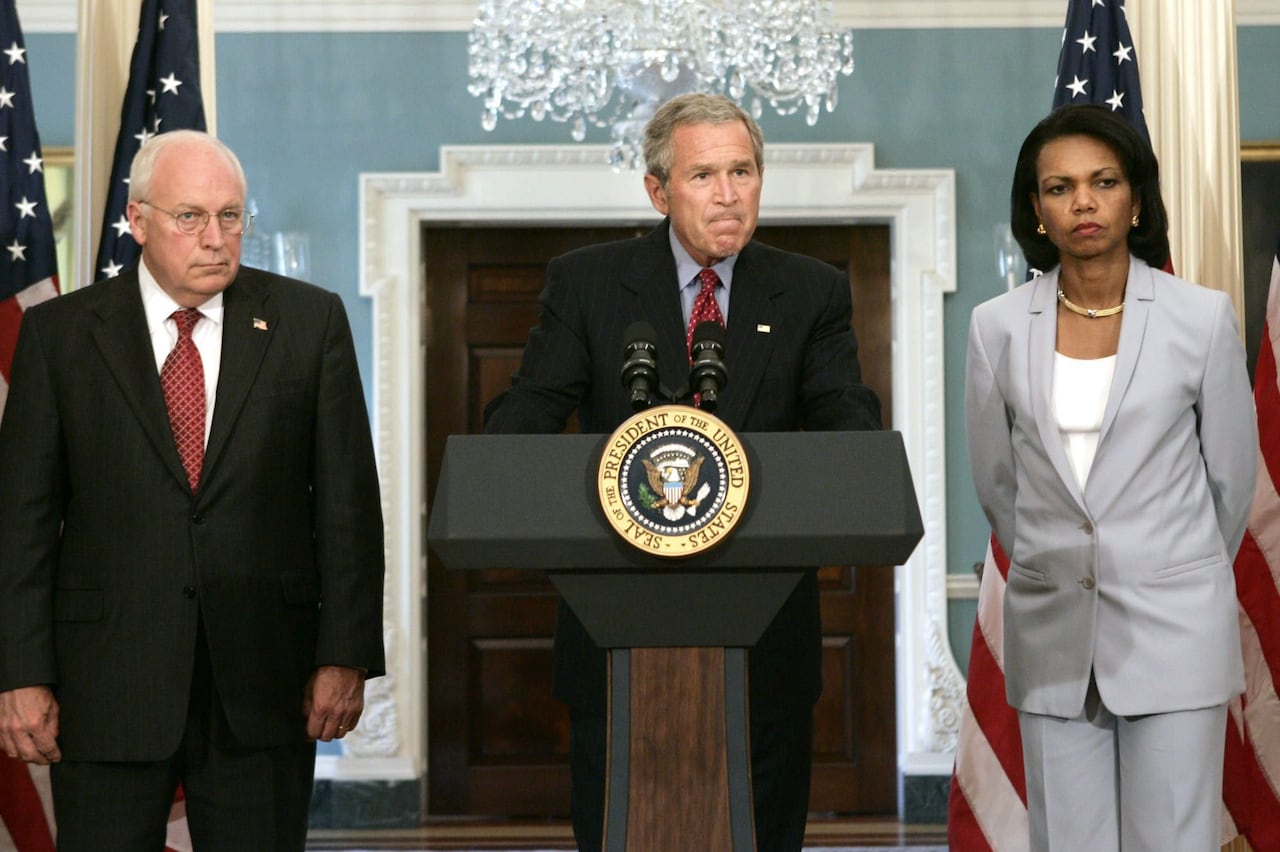 Dick Cheney is shown with president George W. Bush and Condoleezza Rice, then secretary of state, at the White House on Aug. 14, 2006. (The Associated Press)
Dick Cheney is shown with president George W. Bush and Condoleezza Rice, then secretary of state, at the White House on Aug. 14, 2006. (The Associated Press)
Together, the pair faced a protracted 2000 post-election battle over vote tabulations in Florida before they could claim victory over Democrat Al Gore.
Cheney took charge of the presidential transition before victory was clear and helped give the administration a smooth launch despite the lost time. On Capitol Hill, Cheney lobbied for the president’s programs in halls he had walked as a member of Congress and the No. 2 Republican House leader.
Cheney was, in effect, the chief operating officer of the younger Bush’s presidency. Fixed with a seemingly permanent half-smile, Cheney joked about his outsize reputation as a stealthy manipulator.
“Am I the evil genius in the corner that nobody ever sees come out of his hole?” he asked. “It’s a nice way to operate, actually.”
Repeated miscalculations in Iraq
Terrorism became a prime concern after the attacks on New York and Washington on Sept. 11, 2001. Cheney consistently defended the extraordinary tools of surveillance, detention and inquisition employed in response to the attacks.
In the months after the 2001 attacks, Cheney operated much of the time from undisclosed locations, kept apart from Bush to ensure one or the other would survive any follow-up assault on the country’s leadership.
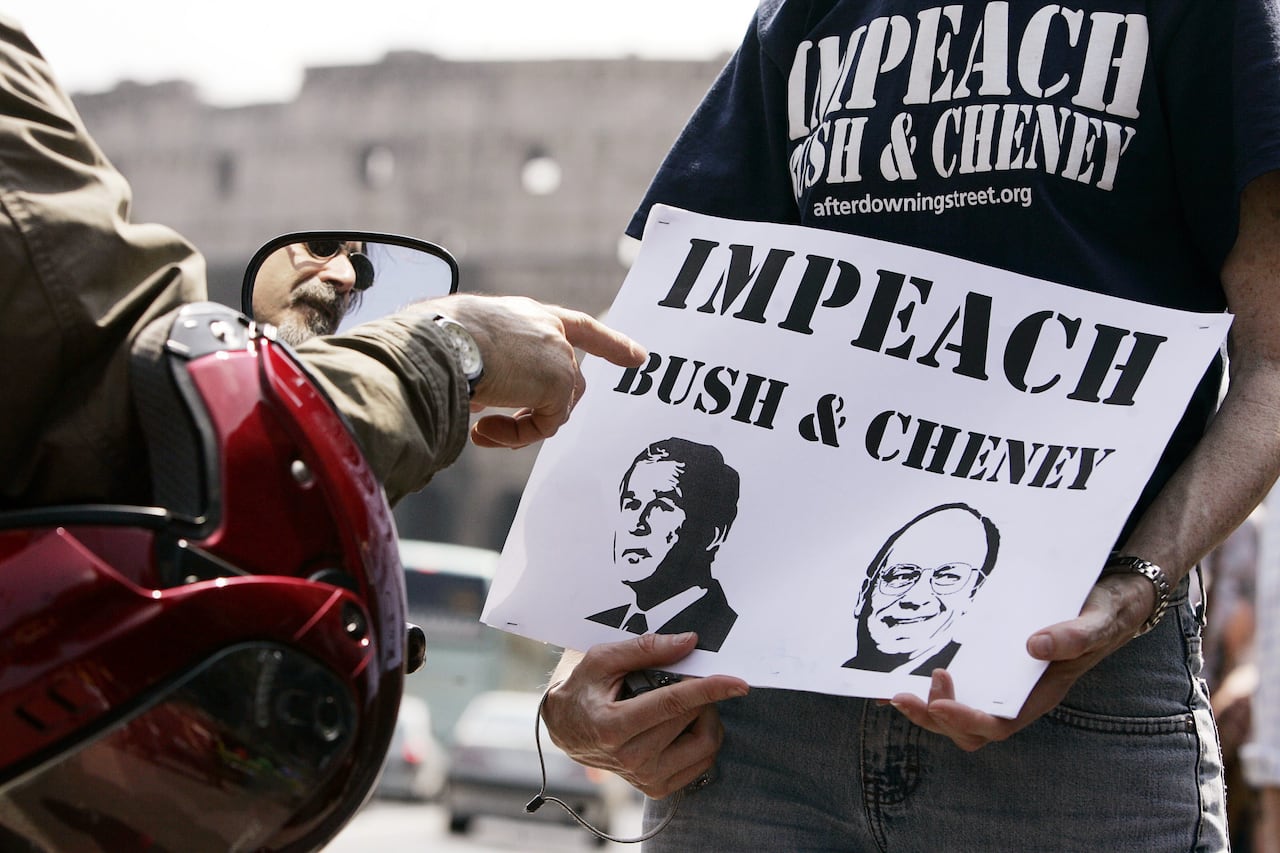 A Texas citizen living in Italy holds up a placard calling for the impeachment of president George Bush and vice-president Dick Cheney because of misrepresentations over the war in Iraq, in Rome on April 28, 2007. (Gregorio Borgia/The Associated Press)
A Texas citizen living in Italy holds up a placard calling for the impeachment of president George Bush and vice-president Dick Cheney because of misrepresentations over the war in Iraq, in Rome on April 28, 2007. (Gregorio Borgia/The Associated Press)
His penchant for secrecy and backstage manouevring had a price. And when he hit a hunting companion in the torso, neck and face with an errant shotgun blast in 2006, he and his coterie were slow to disclose that extraordinary turn of events.
The vice-president called it “one of the worst days of my life.” The victim, his friend Harry Whittington, recovered and quickly forgave him. Comedians were relentless about it for months. (Whittington died in 2023.)
Along with his one-time mentor, secretary of defence Donald Rumsfeld, Cheney was among a coterie of Bush advisers who alleged links between the 2001 attacks against the United States perpetrated by al-Qaeda militants and prewar Iraq that didn’t exist. It culminated in the famous, erroneous U.S. declaration justifying the invasion that Saddam Hussein had an extensive program for developing weapons of mass destruction.
The Bush administration grew hubristic after initial success in Iraq, and the toppling of Hussein in 2003.
Cheney said U.S. troops would be welcomed as liberators, but they were not, and the invasion spawned a number of attacks in opposition from militants in Iraq, Iran and Syria. In May 2005, Cheney declared the Iraqi insurgency in its last throes. At the time, 1,661 U.S. service members had been killed, not even half the toll by war’s end.
By Bush’s second term, Cheney’s clout waned, checked by courts or shifting political realities.
Courts ruled against efforts he championed to broaden presidential authority and accord special harsh treatment to suspected terrorists. His hawkish positions on Iran and North Korea were not fully embraced by Bush.
Cheney was born in Lincoln, Neb., son of a longtime Agriculture Department worker. Senior class president and football co-captain in Casper, he went to Yale on a full scholarship for a year but left with failing grades.
He eventually enrolled at the University of Wyoming and renewed a relationship with high school sweetheart Lynne Anne Vincent, marrying her in 1964. He is survived by his wife, and by daughters Liz and Mary.
He was reportedly annoyed when Mary Cheney’s same-sex identity was brought up during an exchange on gay rights by Democrat John Edwards in a vice-presidential debate in 2004.
After his two vice-presidential terms, Cheney retired to Wyoming, not far from where Liz a few years later bought a home, and she won his old House seat in 2016.
Embroiled in Trumpian attacks
Liz Cheney, who reliably voted for president Donald Trump’s priorities in his first term, became the leading Republican critic and examiner of Trump’s desperate attempts to stay in power after his election defeat and his actions in the Jan. 6, 2021, riot at the Capitol.
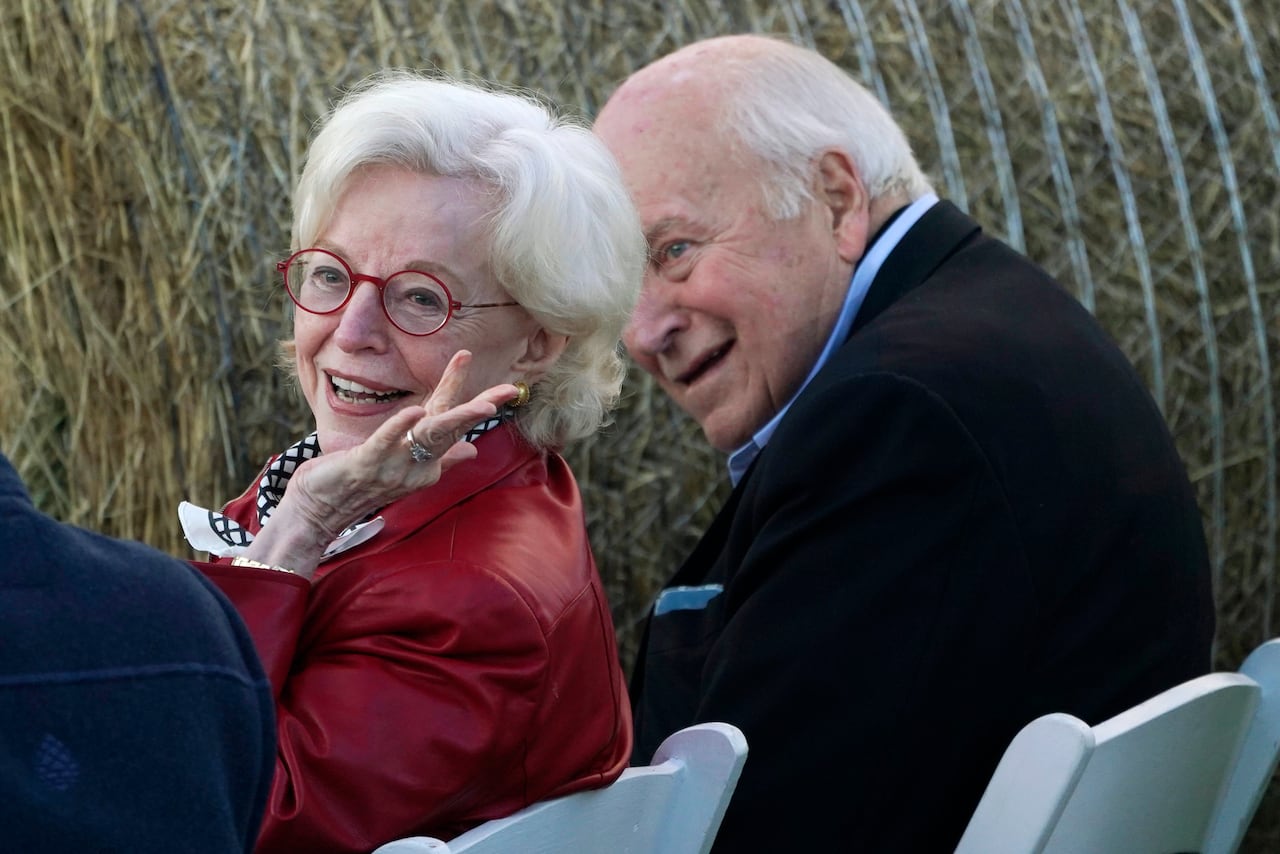 Dick Cheney is shown with his wife, Lynne, at an election campaign event for their daughter Liz Cheney, in Jackson, Wyo., on Aug. 16, 2022. (Jae C. Hong/The Associated Press)
Dick Cheney is shown with his wife, Lynne, at an election campaign event for their daughter Liz Cheney, in Jackson, Wyo., on Aug. 16, 2022. (Jae C. Hong/The Associated Press)
Liz Cheney’s vote for Trump’s impeachment after the insurrection and her lead role on the committee investigating Jan. 6 earned her praise from many Democrats and political observers outside Congress.
Cheney supported his daughter, calling Trump a threat to the republic, but that didn’t keep her from losing badly in the 2022 Republican primary, a dramatic fall from a position of authority in the House.
In the wake of that result, Trump in a social media post characterized Dick Cheney as an “irrelevant RINO (Republican in name only).”
In a twist the Democrats of his era could never have imagined, the Cheney patriarch said last year he was voting for their candidate, Kamala Harris, for president against Trump.
Having survived five heart attacks, Cheney long thought he was living on borrowed time, declaring in 2013 he awoke each morning “with a smile on my face, thankful for the gift of another day.”

